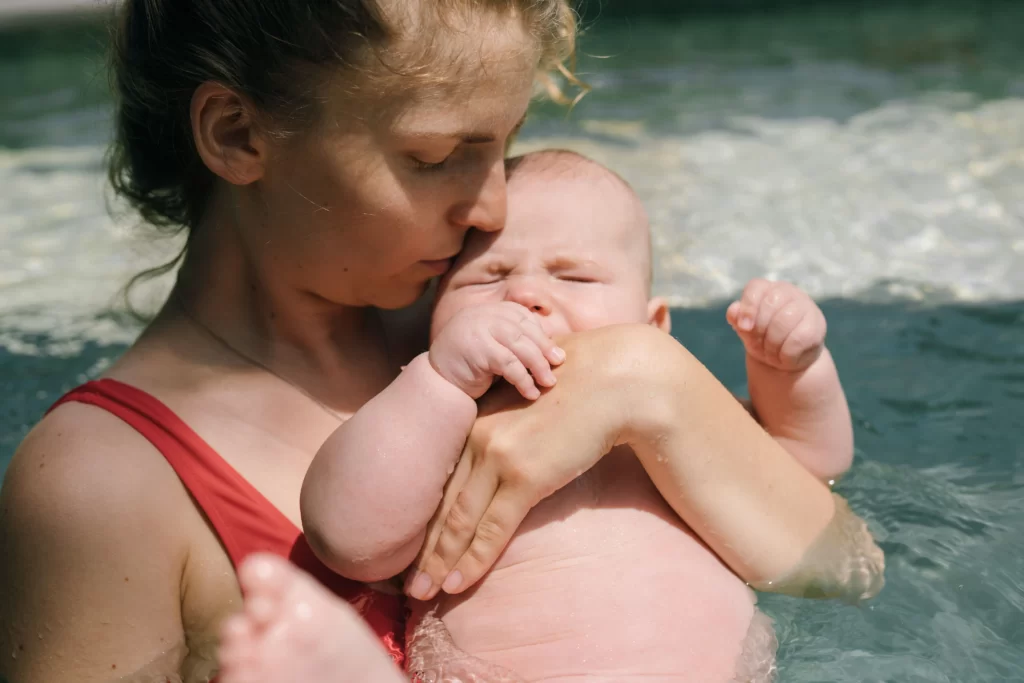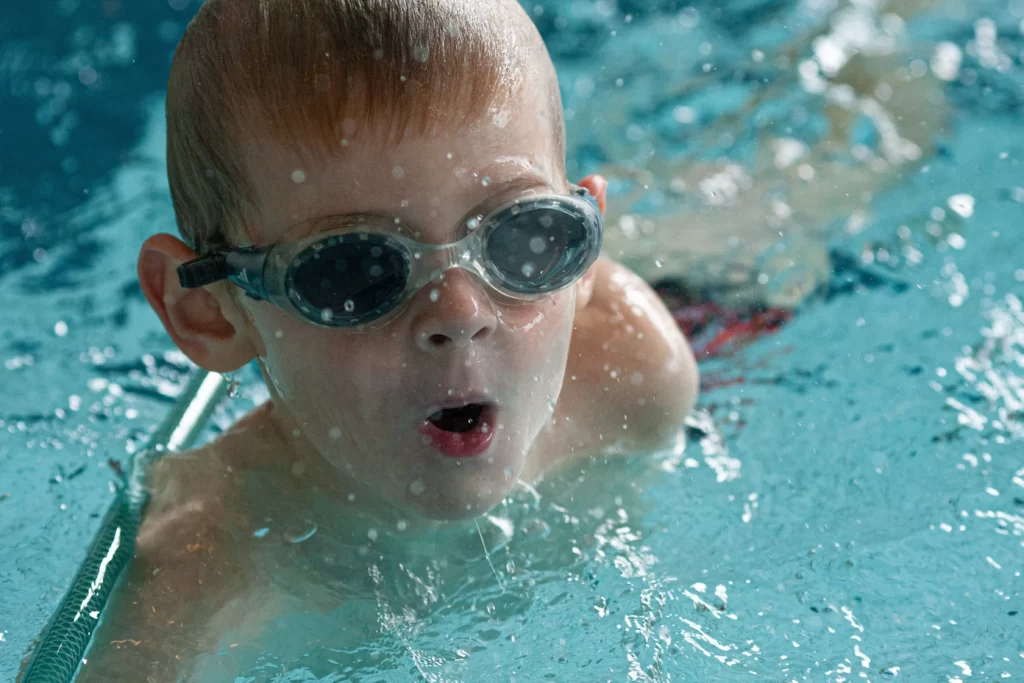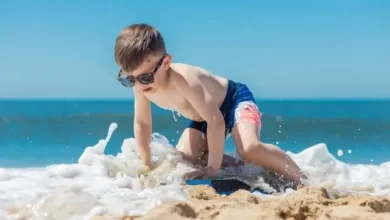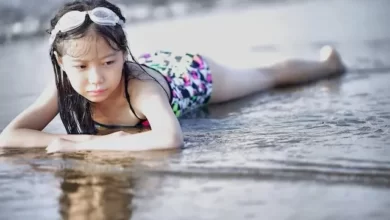7 tips for a baby to start swimming at the right age

In this article
What is the right age for a baby to start swimming?
According to most paediatricians and swim schools, waiting until a baby is at least 6 months old is recommended before starting swimming. This is because before 6 months babies have not developed the necessary physical and immune system response to handle being in the water safely. It is not safe for a baby to enter the water before 6 months.
It is also important to ensure that the baby is developmentally ready and has good neck and head control before starting swimming. However, always consult with a paediatrician before starting any new activity for your baby.
AAP(American Association of Pediatrics) recommends that one should wait until the child is 4 years old before enrolling the regular swimming classes. According to them, only after 4 a child is physically prepared to learn lessons.
As experts say that you can start taking your little one to parent-child swimming classes. And also it is very important to remember that newborns and infants younger than 12 months old aren’t yet able to raise their heads above water to breathe, so swimming lessons aren’t suitable for them.

Firstly at a very young age like one year, you must try parent-child water play classes. This will help your baby to get accustomed to being in a pool. Ai will also help you to create a deep bond between you and your little one.
And when you are thinking to start your child on swimming lessons, take a break and observe the emotional maturity, physical development, interest in learning to swim, and comfort level in the water.
Mostly at the age of 4 children are ready for regular swimming classes. At this age, they can easily grasp basic skills such as floating, treading water, finding a way out of the water etc.
If you are ever confused or unsure when to start your child swimming, ask a healthcare provider for advice.
What are the reasons to start baby swimming early?
- Safety: Early swimming helps to reduce the chances of drowning in the water.
- Physical benefits: It helps to improve the muscle and impacts all over the body growth it also enhances the sleep pattern and appetite. Also helps to develop their gross motor skills, balance and coordination.
- Mental benefits: Swimming can be a fun and engaging activity that can help improve a baby’s cognitive development and social skills.
- Bonding: Swimming can help you create a sweet and strong bond with your little one. It also creates good memories with your baby and other family members.
- Fear reduction: Playing in the water from an early age helps the child to understand the water in a better way and it reduces the fear of water.
But need to remember that every child is different so development also varies from child to child, in this case, it is recommended to consult with a paediatrician before starting swimming lessons.
How to introduce a baby to swimming?
If you finally decided to start swimming then you can not or should not start it alone without a trained expert or supervision. Do follow the steps mentioned below for a younger baby.
- Choose a safe and appropriate setting: Find a warm, clean pool where your baby can swim comfortably. In the supervision of a certified trainer.
- Start with a short session: For a very young baby, you must start with a very short session to make it comfortable for him or her at first, then if it is enjoyable for him or her you can increase the duration in the water. You can start with a five to ten minutes session.
- Make it fun: Use toys, songs or games to make the moment more enjoying and engaging.
- Maintain close supervision: Always stay close to your baby and keep a firm grip on them while they are in the water.
- Gradually increase the length of the session: Also remember, any kind of swimming lesson should not be learned until the baby learns to keep their head up from the water. So you can start with the very basics and early steps like a. Teach them to float
b. Teach them to roll over and keep their head out of the water
c. Teach them to move the sides of the pool
As your child learns these three things properly then you can go ahead for further steps even a stroke.
- Use proper floating devices: Consider using a life jacket to ensure the safety of your baby.
- Give proper care after swimming: Follow some steps to keep your baby dry and comfortable out of the pool.
- Put your baby on a mattress.
- Dry him or her with a towel.
- Put some moisturiser on the body.
- Keep in a safe place, away from the pool.
How to help your child to enjoy swimming?
Here are some fun tips to make swimming a more enjoyable game for your little pumpkin.
Step 1: Move into the water with them. If you are afraid of pools then select a baby pool for them where the depth of water is not more than the waistline.
Step 2: Carry their all-time favourite toy along. Children love toys. So it will be easier to please them with toys.
Step 3: Always maintain eye contact with them. It gives them a feeling of security.
Step 4: Try to click pictures with them. The younger generation seems more camera-friendly than the older one. So try to take the simple phone camera along. And capture some sweet memories with your little bundle of joy.
Step 5: who doesn’t love gratification? Reward them with their favourite toys, snacks or sometimes with a warm affectionate cuddle.
Step 6: Give them exciting swim gear. It will give them excitement to swim.
What should do for safety?
Must follow some safety tips.
- You should know CPR(Cardiopulmonary resuscitation). It is very important to know as your baby is swimming in the pool. CPR is mainly a process of reviving an unconscious person, especially a person who has been a victim of drowning.
- Float is an important thing. When your baby is in the pool, please ensure that there is a float around his or her waist. Otherwise, a life jacket can be a good option.
- Beware of hypothermia. Always check the pool temperature before starting swimming. Because it can be harmful to your baby if the temperature of the pool water is less than 32 degrees Celsius.
- Supervision is the most important thing. Always stay in touch with your child. If he or she is younger than 4 years, always keep a physical touch with them.
- Also, beware about pool born infections. Swimming pools are excellent breeding grounds for all kinds of germs. So use safe swimming gear to avoid infections.
- Never push your baby too hard to swim. If he/she is not comfortable with it then give them time because every child is different. Understand their problem and support them.
What should you look for when choosing swim lessons?
When you are choosing a swimming class for your baby. so follow these things for your baby’s better experience.
- Instructor qualifications: Do check the qualification of the instructor. Is he certified or not?
- Class size: Always look for a smaller class because smaller classes are ideal for babies. The instructor can easily pay attention to your toddler.
- Safety: Make sure that the pool and the place are safe for your little one.
- Age range: Check the age range, some swimming schools have a different age range for toddlers, infants, and preschoolers.
- Teaching methods: Look for the teaching methods. Is there a joyful environment for playing learning and staying engaging?
- Schedule: please check the schedule. Is it ideal for your kid or not? if there is any problem with it then talk with your instructor.
- Cost: Consider the cost of the classes, as well as any extra fees for pool membership or materials, when choosing a swim program.
Always remember that the ultimate goal is to create a positive safe and fun experience for your baby. Never push him/her so hard for it. Only go swimming when they are mentally and physically ready for it.
What to carry in your baby’s swimming bag?
You have to carry some necessary things along.
- First aid
- All diaper bag
- Swim gear
- Bathing essentials
- A fresh set of clothes
- Toys, float etc.
Swimming is a skill that if you learn for once then you are going to remember forever. It is like driving a car. So it is a wonderful skill to learn. So if you have decided to take your little shining star to the swimming class then all the very best for a great experience and a better future.

Is swimming good for a 4-month-old?
Yes, swimming can be good for 4-month-old babies, as long as done under the supervision of a trained instructor and in a safe environment.
However, it is important to remember that babies at this age don’t have the physical or cognitive development to swim on their own. All swim activities should be done with close adult supervision and secured in a safe sim position.
Can you teach a 3-month-old to swim?
It is possible to teach a 3-month-old to swim in the traditional sense as they don’t have the physical or cognitive development to swim on their own. At this age, babies don’t have muscle strength.
However, some swim schools offer special “infant swim” or “parent and baby swim” classes that are designed to provide fun, so you can join those classes.
Also, it is very important to consult with your paediatrician before enrolling your baby in any swim classes, especially if your baby has any health condition or special needs.
How do I prepare for my baby’s first swim?
1. Consult with your paediatrician.
2. Choose a reputable swim school.
3. Pack the right gear. Make sure that your child is safe in the water.
4. Arrive early. And understand all the rules clearly.
5. Make sure the water temperature is appropriate. Otherwise, it can be harmful to your baby’s health.
6. Get your baby comfortable in the water.
7. Stay calm and relaxed. Asure your baby is also comfortable in the pool.
8. Have fun with your baby. Engage him/her in fun activities. Play with them.
Is it ok if my baby swallowed pool water?
If your baby has swallowed pool water, it is important to monitor them for any symptoms of illness. Normally, swallowing a small amount of water is not harmful to most healthy babies.
However, pools can contain chemicals, chlorine, and other harmful chemicals that can accuse stomach upset, diarrhoea, and other digestive symptoms in some cases.
Pools can also contain harmful bacteria, microorganisms and viruses that can cause illness. If your child experiences any unnecessary symptoms after swallowing pool water, it is best to contact their doctor. In the meantime, make sure they drink plenty of fluids to stay hydrated.
How can I protect my baby’s skin from chlorine?
1. Rinse off before and after swimming: You have to rinse off your baby before and after swimming to remove extra chlorine and other chemicals from his/her skin.
2. Apply a moisturizer: Always apply a baby’s skin-friendly moisturizer after swimming to keep the skin hydrated. It should be specifically for after-swimming use only.
3. Dress in protective clothing: Carry some clean and dry cloth along. And dress your child in dry clothes after swimming to protect his/her body from the sunlight.
4. Avoid prolonged exposure: Try to limit your baby’s exposure to the sun and in the pool, especially in the peak hours when the sun and the chlorine are strongest.
5. Use baby-friendly products: Make sure that all the products that you are using on your baby’s skin and the diapers and toys are specifically designed for use on babies and have no harsh chemicals.
If you have any concerns about the effects of chlorine on your baby’s skin then it is best to consult with your doctor about it.



